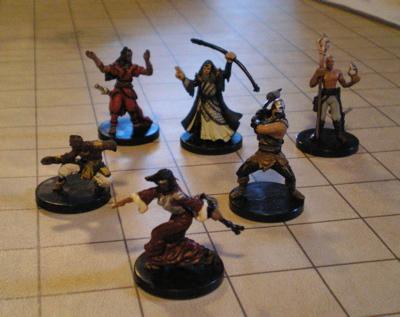 |  |  |  |  |  |  |  | ||
 | ||||||||||
 | Hall of Stone Campaign: | |||||||||
Post-Looting Update New rule: no hero dice during city adventures. Retcon — Writing: I said you found a book written in modern Tsolyáni, but it was written in Engsvanyali. All written communication is in the dead language Engsvanyáli. No one learns to read and write in Tsolyani. Technically, one could use Engsvanyáli letters to write Tsolyani (mostly), but it would be sacrilege. Those perfect letters are for the perfect language used by Pavár when he taught men the true nature of the gods. Besides, why would you want to write a letter to someone who doesn’t know Engsvanyáli? Every literate person knows Engsvanyáli, and there’s no point writing to someone who can’t read. Mechanics: We don’t have to worry about combat mechanics this Wednesday, but there’s work to be done. Abilities: I like simple characters, but four abilities doesn’t seem like enough. Maybe I should rehash the abilities and give everyone six instead of 4. Casting Defensively: Let’s try the game without it. I like the idea of spellcasters suffering for their art. Might be worth having a melee spell for close quarters. Charged Abilities: Something weird is going on with the hold-charge and recharge math. Let’s try this one: When you use a charged ability, it goes away. As a separate but related rule, whenever you roll 10- on your first d20 roll of your turn, you can recharge any discharged ability. If you have only one discharged ability and you roll a 10, you recharge that ability (just like it’s always been). But if you have more than one discharged ability when you roll the 10, you can recharge any of those abilities. Concentration: The DC for holding a spell through damage is 10 + damage. That’s lower than d20, but that compensates partially for lack of casting defensively. Crit: Let’s do away with the critical confirmation roll, on the principle that making combat faster is usually better. Damage: I’m sorely tempted to deal average damage with my monsters. Not having to roll the d20 is a real time-saver, and trying to find the right damage dice is a distraction. Defenses: Only one constant defense per character. Defenses stack. High hit points plus high AC is more like high hit points times high AC. If you want two defenses, make one of them charged. In addition, DR 6 is crazy. Less crazy as your only constant defense, but still crazy. Flat-Footed: I want to use flat-footed as “hard AC only.” Illumination: It’s dark and shadowy in the Underworld, but you can see a long way. As your torch light passes the bas-reliefs, the hideous images carved in the walls loom out of the darkness, stand over you in flickering light, and then fade into shadow behind you. Don’t give another thought to illumination. Initiative: You add your level-based bonus (+1 at 2nd level) to initiative just as you do to any other roll. Monsters: You might recall that that zombies could only get a decent attack off as a full-round action. Their standard-action attacks were default attacks. The outlaws with the sorcerer were the same thing: the only good attack they had was when they sneak attacked. So keep an eye out for what the monsters are up to. Monsters are likely to have attacks with special rules even for their routine melee attacks. One-Shots: There’s room in the system for really big effects that are one per encounter, and maybe even one per session. But they need to be special, not big hammers you can just drop at the start of each battle. Like, once per session you can make an attack against a creature that’s just hit you, something like that. Reserves: As a full-round action, you get 3 hp from reserves, +1 per level over 1st. You do this automatically when you’re unconscious. It totally makes no sense in the world that enemies don’t kack downed PCs, but see illumination. Stairs: For the sake of simplicity, I said stairs didn’t slow movement. But that means that they don’t exist as far as the game’s concerned, which is sad. From now on it’s slow up and normal down. So expect to see terrain worked into future combats. Stealth: A character could take “Dexterous +4,” and that would mean something like “+4 soft AC and +4 on all Dex-based skills.” The character would be able to move silently, tumble, hide, etc.
Post-Conjunction Update Pick a god for your character. Here's a list of all the gods. Remember, this is not the god that your character has chosen. This is your father’s god and your ancestors’ god. There might be another god that you personally prefer, but you are ritually obligated to honor your father’s god. If religion isn’t important to your character, you can roll 1d20 to see which god is your god. Xzánder, as I recall, we agreed that Lord Hrü’ü, the supreme principle of chaos, was your god, and that you were hard at work proving yourself to be secretive, devious, and effective. Vizipozúl, you belong (or think you belong) to a secret society within the temple of Thúmis, but I don’t recall if that’s your father’s god, too. Peetul, it’s Lady Hriháyal all the way, because Lady Dlamélish just isn’t enough for you. Xénmet, you’re the black sheep of your high-status lineage, and you might belong to a temple that’s totally at odds with your personality. For example, Lord Hrü’ü seeks the end of all patterns. Guppagáli, you belong to the temple of Lor d Ksárul, whose priests are actively engaged in exploring the forgotten past in the Underworld. Lord Ksárul almost took over the universe at the Battle of Dórmoron Plain, and if you want to belong to a temple that’s less hard-core than that, we could pretend that you’ve been a devotee of Lord Thúmis all along. Heinsoo’s Character, we can decide whose túnkul bell you sounded out of turn once all the deities are chosen. It’s definitely one of the Lords of Change.
Session Two Prep Two things. One, there's a slave girl that the governor put up as a prize for the last fight in the arena, which you won. You need to decide what you do with this trophy. As with all decisions that you make as players, it will reflect on your whole clan. Reasonable options include one of the four victors keeping the slave, giving that to a member of your clan, or giving that to someone outside the clan (in a temple, etc.). If discussion of this plot point goes on to long, we shall avail ourselves of "story points." Two, each character needs three social traits. These traits will be used in a freeform manner to adjudicate social interactions (figuring out if you're being lied to, talking your way out of trouble, etc.).
Session Two It’s a party. Get ready for high-clan girls, plenty of drink, plus some zu'úr and the gold that you can get by selling it. It’s not your party, but you’re going to make the best of it. In two weeks, the two moons are going to rise, travel across the sky, and set together. That happens about every five months or so. The conjoining of the Lord of Fire and the Green-eyed Lady is a day of extravagant celebrations in decadent Jakálla, where the Lady first made herself known to men. When the moons align, the high White Crystal clan hosts an amazing worship service in honor of the Green-eyed Lady. For Stonehall, this means honoring an ancient clan obligation and sending attendants to help out at the high-clan orgy. Getting sent is an honor and a good time. For this conjunction, Old Man Gayán, the clanmaster, is sending you. You have brought honor to the clan by prevailing in the Hirilákte arena, and the clan is grateful. Even so, you will now be obliged to Old Man Gayán for sending you. It would be crass to speak of this as getting a favor and being expected to repay it, but that’s exactly what it is. Is Old Man Gayán rewarding you or putting you in his debt? Maybe it’s both. This time around, there’s an added bonus for those headed to the White Crystal clanhouse. It’s also an opportunity to sell contraband to high clan men and bring home some gold. You young heroes are being sent to represent Stonehall, and to make a significant sale on the side. The contraband is a powerful aphrodisiac, possession of which is punishable by the “high ride.” Of course, everyone knows that really it’s possession of zu’úr plus lack of connections that’s punishable by impalement. So if you can simply make the connection in the District of the Welcome Other, get the goods to White Crystal, and meet the contact, you’ll bring in gold for the clan, you’ll be able to party with the White Crystal folks (sort of), and you’ll have no trouble skimming plenty of zu’úr off for yourself. What could go wrong?
Session One You have been sentenced to fight in the hirilákte arena. Usually it is ignoble people who die in the arenas: slaves, captives, nakome (clanless), foreigners, and criminals. But in your case, you are a noble man and a kinsman in good standing at the Hall of Stone. (Not a “noble” in the feudal sense, but a man of noble action.) You have been given your sentence wrongly, unfairly, accidentally, or by extraordinary ccircumstance. You have been:
As kinsmen at the Hall of Stone, you have a right usually reserved for high-caste men, the right of shared blood. All of you will face death in the arena together. Your advantage is that you’ll work together to face your foes. Your disadvantage is that if even one of you dies, the rest of you will be put to death. You will all survive or all die, together. The fact that you have the right of shared blood demonstrates the superior, noble nature of the Hall of Stone. Your kinsmen hope beyond hope that you will survive and prove the clan’s valor. Your rivals from the Black Stone clan are sure to be at the arena to gloat over your demise. You are the clan and the clan is you. Don’t let the clan down.
| ||||||||||
Xen-Mét, Visipozél, Peétul, Xzánder, torch-bearer, and Gupaggáli | ||||||||||